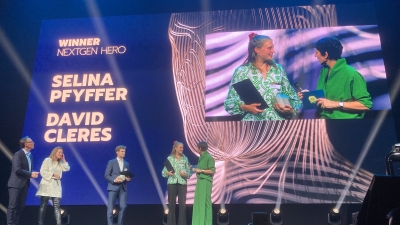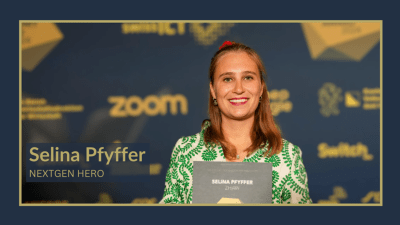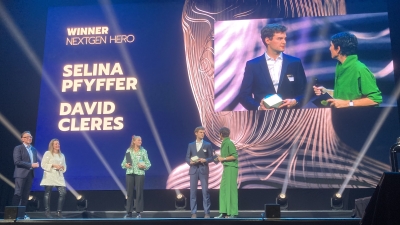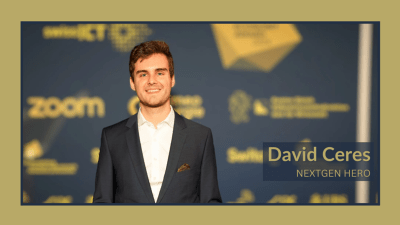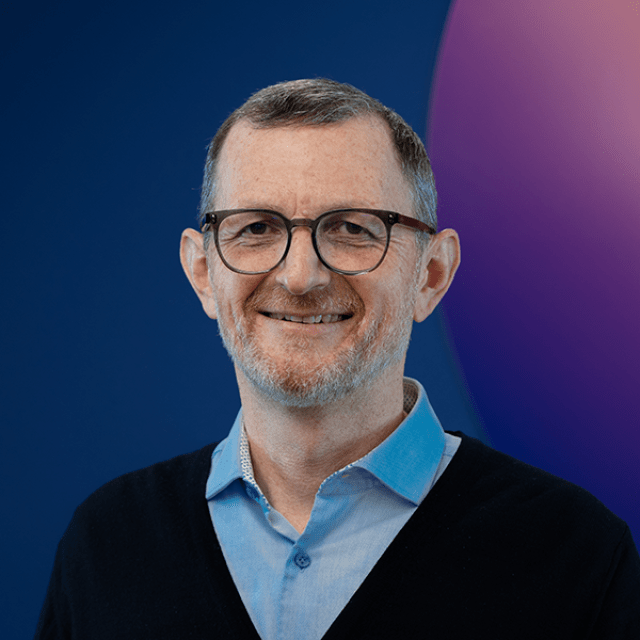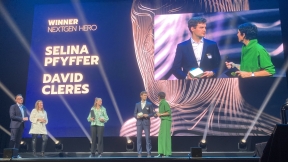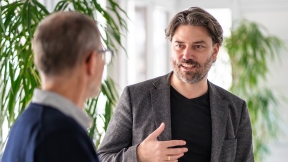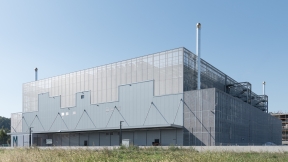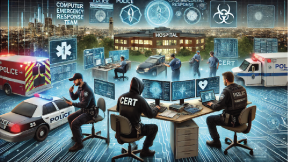Young talents win 'NextGen Hero' Award
At the Digital Economy Awards ceremony on 14 November 2024, two outstanding young talents were also celebrated as 'NextGen Heroes' for their creativity and innovation. Who are these rising stars, and what are their aspirations? Discover their projects and visions.
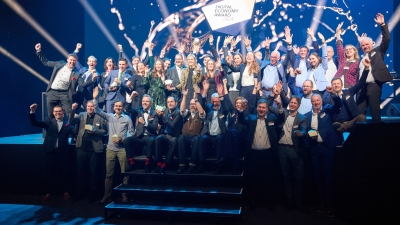
Have you ever stood on stage, receiving an award in front of a large audience? Then you know the excitement of seeing your hard work and passion celebrated. The finalists of the ‘Digital Economy Award’ felt that excitement on 14 November in Zurich’s Hallenstadion.
The fifth edition of the awards ceremony brought together hundreds of experts from the Swiss ICT industry to honour the most outstanding talents and their innovations. Awards were presented to the top achievers in six categories, including these two outstanding young talents in the ‘NextGen Hero’ category: Selina Pfyffer, student at the ZHAW, with ‘SeasonCell’ and David Cleres, EPFL student, with ‘GirlsCodeToo’.
In a 90-second live pitch, they were able to convince the audience of their innovative ideas and passion. Discover in our interview what inspires these young talents and how they are contributing to digital progress in Switzerland.
Switch: Dear Selina, congratulations on winning the Digital Economy Award in the NextGen Hero category. Please explain briefly what your winning project ‘SeasonCell’ is about.
Selina Pfyffer: Our idea is based on the principle of the well-known hand warmers in which you click a metal plate. The liquid material crystallises immediately and becomes warm. A large energy store is created by the clever interaction of hundreds of hand warmers and an AI controller. For example, in summer, surplus energy from photovoltaic systems can be used to liquefy the hand warmers. When energy is needed in winter, you click individual cells and feed the heat released into the heating system. The advantage: once the cells have been charged, the energy they contain can be stored without loss.
What vision are you pursuing with this?
We want to develop a technology that will actually enable us to achieve the planned energy transition. The demand for long-term storage solutions in the economy is enormous. And yet there is still no economical solution today.
What has been your greatest achievement for SeasonCell so far?
During our studies, we decided against a master's thesis that we simply write for a professor. We definitely wanted to do a master's thesis around the development of our own product. To do this, we successfully raised initial investment capital, went to our professors with it and asked them for support. Our team of five engineers is extremely competent and committed. Without this team, I wouldn't be standing here today.
What stage of development is SeasonCell at today and what are your plans for the next few years?
We managed to develop a functional prototype while we were still studying for our master's degrees. Now we need to find investors to further develop the prototype and make it more efficient and economical. To do that, we need money that we can invest in research and hardware. We want to bring our energy storage system to market in three years at the latest.
Why do you think SeasonCell was able to win over the audience against your competitor?
I think the audience sensed that we are passionate about changing our world and driving the energy revolution forward.
What do you hope to gain from the Digital Economy Award?
For SeasonCell, this is a real springboard. The award gives us the recognition we need for having developed something cool in Switzerland. Hopefully, this will help us a lot in our search for investors.
What advice would you give to young students to help them win a Digital Economy Award next year?
Believe in yourselves and in what you do. Then you'll be in the right place on this stage. People can sense when you are putting your ideas into practice with full passion.
Switch: Dear David, congratulations on winning the Digital Economy Award in the NextGen Hero category. Please explain briefly what your winning project ‘GirlsCodeToo’ is about.
David Cleres: We support and encourage girls aged 9 to 13 to discover programming and try out technology. To do this, we provide them with the necessary skills to explore a career in the technical field. Ultimately, we are working to foster their talents and curiosity by introducing them to software tools, different programming languages and processes that they can use to develop apps, games, websites and robots.
What vision are you pursuing with this?
In the long term, we want to offer coding courses at holiday camps and in public schools throughout Switzerland. For example, we have started a collaboration with the municipality of Silvaplana in the Engadine. There, we want to build a programme around coding and education during the holiday season that complements the existing sports facilities. Overall, this helps us to get in touch with schools that were initially rather sceptical. As we repeat our courses throughout Switzerland, we can invest more in materials like robots than a single school can. This way, we enable girls to experience technology in a much more hands-on way.
What has been your biggest achievement for GirlsCodeToo so far?
We are a team of volunteers working on a pro bono basis. Without these talented people and their experience, we would not have grown as big as we have. We have now reached a point where a volunteer project is too big to do in our free time. But we are not yet at the point of being able to finance it ourselves and hire full-time employees with a normal salary.
What are your plans for the next few years?
In the beginning, we built a lot of websites and digital solutions. As a supplement, we are now also building physical things. This includes, for example, 3D printing courses where girls print a lamp that they can use as an IOT. Then there is a big goal to ride the ChatGPT wave. We want to explain what it is about and how they can use the tool exactly.
Why do you think GirlsCodeToo was able to win over the audience against your competitor?
It was cool to present my project on stage. The 90 seconds were very short for that. But I think I was able to get my message across clearly and convincingly.
What benefits do you hope to gain from the Digital Economy Award?
We have already been able to make initial contacts here on site. There are a lot of people here who make decisions and can support us or help us in other ways. And if they still have some budget left over by the end of the year, they know how to invest it.
What advice would you give to young students to help them win a Digital Economy Award next year?
You have to prepare well to get your message across in the short time available. Just taking part is very educational. You get pitching training to present your project on this stage in front of a large audience. Then there are so many other learning opportunities, not just today, but also in the selection process. You have to ask yourself exactly where you stand and what you actually want to achieve. All of this has helped us a lot in consolidating what we have.
Dear Selina and David, thank you very much for the interview. We wish you continued success.
Links:
